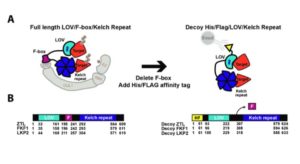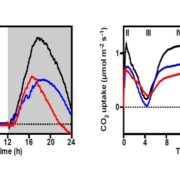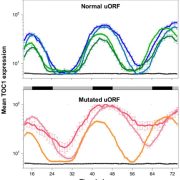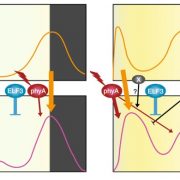Decoys untangle complicated redundancy and reveal targets of circadian clock F-box proteins (Plant Physiol)
 The processing of the circadian clock requires that regulatory proteins are ubiquitinated and degraded, through their interactions with F-box proteins. Lee et al. used a decoy strategy to characterize the targets of three related F-box proteins involved in clock function, ZTL, LKP2 and FKF1, which genetic studies have indicated have partially diverged, partially redundant activities. Their strategy involved replacing the F-box domains (to prevent ubiquitination of their targets) and inserting a His-tag in order to immunoprecipitate F-box protein / target complexes. Key findings include evidence for a threshold effect in the use of the decoy proteins, and the identification of distinct effects and binding partners for the three F-box proteins. The authors also demonstrate the benefits of a mammalian tissue culture cells as a heterologous ubiquitylation system. (Summary by Mary Williams) Plant Physiol. 10.1104/pp.18.00331
The processing of the circadian clock requires that regulatory proteins are ubiquitinated and degraded, through their interactions with F-box proteins. Lee et al. used a decoy strategy to characterize the targets of three related F-box proteins involved in clock function, ZTL, LKP2 and FKF1, which genetic studies have indicated have partially diverged, partially redundant activities. Their strategy involved replacing the F-box domains (to prevent ubiquitination of their targets) and inserting a His-tag in order to immunoprecipitate F-box protein / target complexes. Key findings include evidence for a threshold effect in the use of the decoy proteins, and the identification of distinct effects and binding partners for the three F-box proteins. The authors also demonstrate the benefits of a mammalian tissue culture cells as a heterologous ubiquitylation system. (Summary by Mary Williams) Plant Physiol. 10.1104/pp.18.00331









